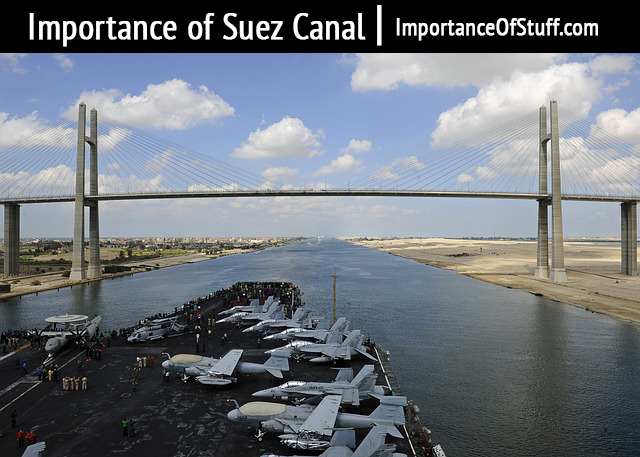Suez Canal, a navigation link built between the Mediterranean Sea at Port Said and Red Sea at Suez, is known for its strategic location and geographic importance. In the past, many disputes, crises and wars have been fought over the ownership of Suez Canal. In July 1956, Egypt’s President Gamal Abdel Nasser nationalized the Suez Company – previously a joint British-French enterprise operating the Canal since its construction in 1869.

Britain, France, and Israel responded to this by ordering co-ordinated attacks to seize back the Canal Zone, and soon an Anglo-French military presence was established. The international community saw this as aggression by colonial powers. This lead to the withdrawal of British and French troops that were then replaced by a United Nations force.
Egypt re-opened the Canal to ships after being granted ownership over the Canal by UN in April 1957. It’s important that we look at the position of the Canal to understand its relevance today.
- Suez Canal cuts the length of time to get from Europe to the East, by half. This allows ships in European waters to sail to Asia without having to go around the entirety of Africa through Cape of Good Hope, cutting about 8200 kilometres off the trip from England to India. This shorter and faster route enables more goods to be transported in a year. Manufacturers make more, shippers make more, and the consumers get their goods faster – directly making the economies thrive better.
- Today, 80% of the world trade volume is being transported via waterways. The construction of the Canal has made global trade more powerful than ever. The Canal is central to maintaining overseas links especially with the Middle East – which is the main source of oil in the world. It is majorly used by Maritime trade companies to exchange goods with India, China, and South-East Asia.
- With most developing countries being in the Middle East and Asia, the Canal has proven to be a great source of revenue to help develop the countries around it. The main source of revenue for the Suez Canal company comes from the merchant ships that pay tolls. Additionally, the company requires labor force to run and keep the coasts around the canal from eroding – which the Egyptian market force provides, today.
- History tells us that this artificially built Canal has been a ground for dispute. This automatically makes the Canal a ground for defense – and the country that is granted autonomic power over it, can set up its naval troops and strengthen its military hold. This is true as we see in the case of Egypt that regards its autonomy over the Canal as a mark of power.
- Since the canal is man-made, there is always a scope for it to be widened whenever there is a need to cope with a development in ship sizes or tonnages. The Canal has now got an extra lane for ships to navigate as a two-way highway making for faster transit. Additionally, the Canal is now deeper to allow for easier navigation of bigger container ships.
The importance of the Suez Canal is increasing with the evolution of Maritime transport and world trade. The Canal has no locks; accidents are almost nil; navigation through the Canal happens day and night; and most importantly, navigators greatly reduce transit time.
Also read: The Importance of Being Earnest
To understand the importance of the Canal, one can simply look at Egypt which produces little oil but occupies this strategic position on the international sea shipping route of oil barrels. It makes revenue from the 3000 million barrels that pass through the Canal each day. In a globalized world where merging of markets makes us more and more dependent on transport of goods and services, the Canal has placed Egypt with a strong hold on global economy. Thus, this project has transferred the cities around the Canal into an important trading center globally.